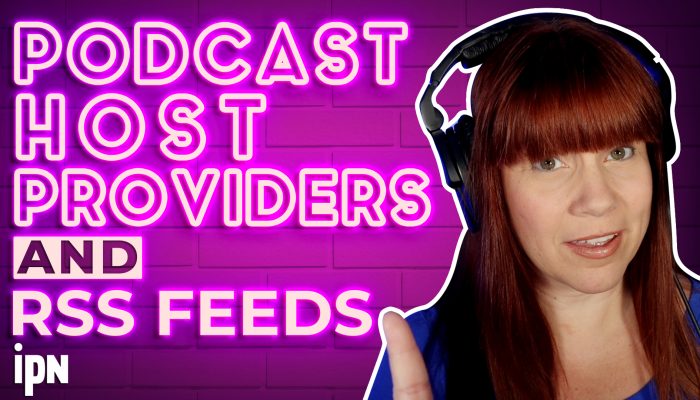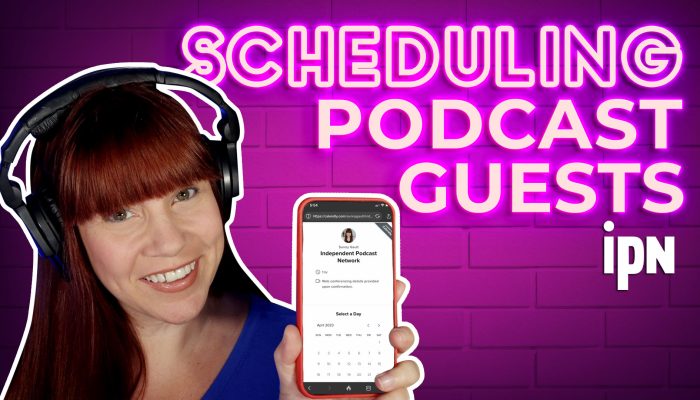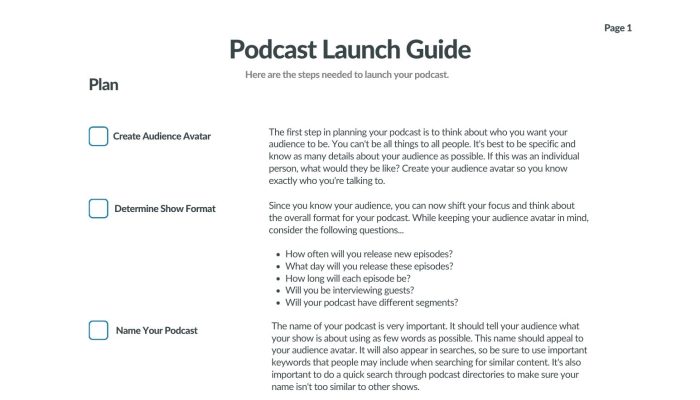
To attract high-quality guests and secure valuable sponsorships, you need to go beyond just creating great content. You need to effectively communicate the unique value of your podcast to potential partners.
Investing time in identifying the value of your podcast sets the stage for effectively selling the value of your podcast to guests and sponsors. It helps you communicate your worth, attract the right partners, and guide your podcast’s growth and success. And in this article, we’re going to show you how to do exactly that by going over what a value proposition is and then each aspect you should include in your value proposition.
What is a Value Proposition for Your Podcast?
So, what exactly is a value proposition? It’s a clear, concise statement that communicates the unique benefits and worth of your podcast to your target audience, guests, and sponsors. It answers the question, “Why should someone listen to, appear on, or sponsor my podcast?” A well-defined value proposition states how your podcast stands out from the competition.
Metrics That Matter: Quantifying Your Podcast’s Reach
Metrics are powerful tools that demonstrate the tangible impact and growth of your podcast. They provide concrete evidence of your show’s performance and help you make a compelling case for why guests should appear on your podcast and why sponsors should invest in your platform. Here are a few metrics you can use to showcase your podcast’s reach:
- Download Numbers and Audience Growth: Showcase the total number of downloads and streams your podcast has achieved, and highlight any significant milestones or growth trends over time. This data demonstrates your podcast’s popularity and reach.
- Listener Demographics: Provide insights into the age, gender, location, and interests of your audience. This information helps potential partners understand who they’ll be reaching by collaborating with your podcast.
- Geographic Reach: Highlight the countries, regions, or cities where your podcast is most popular. This data is valuable for sponsors looking to target specific geographic areas.
- Engagement Metrics: Showcase the number of reviews, ratings, and social media interactions your podcast generates. High engagement rates demonstrate that your listeners are actively involved and invested in your content.
- Reviews and Testimonials: Share screenshots of positive reviews or testimonials from your listeners to add social proof to your pitch. This helps potential partners see the impact and value of your podcast through the eyes of your audience.
To provide context for your metrics, research industry benchmarks and compare your podcast’s performance to similar shows in your niche. This helps potential partners gauge how your podcast stacks up against the competition. And when presenting your metrics, use visually appealing and easy-to-understand formats such as graphs, charts, or infographics.
Showcasing Your Expertise and Authority
When it comes to selling the value of your podcast to potential guests and sponsors, your expertise and authority in your niche play a crucial role. Showcasing your knowledge and experience helps guests and sponsors feel comfortable that speaking on your podcast adds to their credibility.
Niche Experience and Credentials
Share your relevant background, education, and professional achievements that make you a trusted voice in your industry. If you have any certifications, awards, or notable accolades, be sure to mention them in your pitch.
Notable Guests
Highlight the experts, influencers, and thought leaders you’ve interviewed and share their testimonials about their experience on your show. This social proof helps potential guests and sponsors see the caliber of individuals you attract and the value they gained from being a part of your podcast.
Social Proof
If your podcast has been featured in industry publications, blogs, or news outlets, showcase these media mentions in your pitch. This third-party validation helps reinforce your expertise and authority in your niche.
Describing Your Expertise
It’s important to strike a balance between confidence and humility. While it’s essential to highlight your accomplishments and successes, avoid coming across as boastful or arrogant. Instead, focus on how your expertise and authority can benefit your potential guests and sponsors and help them achieve their own goals and objectives.

Demonstrating Niche Relevance and Audience Alignment
Including how your podcast is relevant to your potential sponsor’s or guest’s target market zeros in on exactly why your podcast fits their needs. Here’s how you can identify and demonstrate niche relevance and audience alignment:
- Research your potential guests and sponsors: Familiarize yourself with their background, expertise, and the products or services they offer.
- Tailor your pitch to emphasize shared values and target audiences: Highlight how your podcast’s content and audience demographics align with their niche and goals.
- Provide detailed insights and data about your listeners: Share information about your audience’s demographics, interests, and engagement levels. Demonstrate how your audience aligns with their target market and the potential impact of collaborating with your podcast.
- Offer creative and customized sponsorship packages (for sponsors): Tailor your sponsorship offerings to showcase how your podcast can effectively promote their products or services to your niche audience.
- Share examples of successful content that resonated with your audience: Highlight specific episodes, guest interviews, or topics that have generated high engagement, positive feedback, or measurable results.
- Emphasize your podcast’s unique perspective and approach within your niche: Identify what sets your podcast apart from other shows in your industry, such as your distinct hosting style, format, or storytelling approach.
- Be authentic and genuine in your approach: Avoid overpromising or misrepresenting your podcast’s niche relevance or audience alignment.
Remember to customize your approach for each partner, emphasizing the unique value and opportunities your podcast brings to the table.
Conclusion
While laying out the value of your podcast, stay true to your unique voice, mission, and values. Authenticity and integrity are key to building trust and credibility with your partners and audience. Don’t be afraid to experiment, iterate, and adapt your strategies as you learn and grow.
Embrace the challenges and opportunities that come with building a successful podcast, and use them as fuel to continue refining your craft and delivering exceptional value to your listeners and partners.









